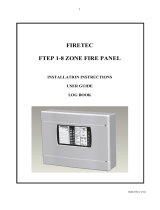
SIMPLICITY USER MANUAL, MAINTENANCE GUIDE & LOG BOOK
Approved Document No: GLT.MAN-108
PAGE 4
Issue: 2.00 Authorised: GH Date: 04/06/2007
3. USER RESPONSIBILITIES & MAINTAINENCE OF THE FIRE ALARM SYSTEM,
INCLUDING THE FACP & ITS INTEGRAL PSE
According to the British Standard Code for Fire Detection and Alarm Systems for Commercial Buildings
(BS5839: Pt 1: 2002), the owner or person having control of the premises should appoint a responsible person
to oversee the effective operation of the Fire Alarm System (Clause 47.1).
Below is a summary of the main functions the “Responsible Person” is expected to carry out. This summary is
not intended to replace Section seven (User responsibilities) of BS5839: Pt 1: 2002 (available from BSI, or your
local library). It is meant to give a brief outline of user responsibilities for the safe upkeep of the Fire Alarm
System. The number in brackets shows the relevant BS5839: Pt 1: 2002 clauses.
The responsible person must:-
1. Have sufficient authority to carry out the duties associated with being the responsible person (47.2.a)
2. Check the system at least once every 24 hours to ensure there are no faults present (47.2.b)
3. Ensure there are arrangements for testing and maintaining the system (47.2.c)
4. Ensure the log book is up to date, and available for inspection (47.2.d)
5. Instruct all relevant occupants on the basic operation of the system, including start evacuation, silence
alarms, silence faults and system reset (47.2.e)
6. Take appropriate action to limit the rate of false alarms (47.2.f)
7. Ensure that all detectors and manual call points remain unobstructed at all times (47.2.g)
8. Liase with maintenance personnel to ensure that cleaning, maintenance or building work does not interfere
with the functioning and reliability of the fire alarm system (47.2.h).
9. Ensure any changes to the system are recorded with updated drawings, operating instructions etc (47.2.i)
10. Ensure that there are spare parts (especially Call point elements) held on site (47.2.j.1&2)
11. In the event of a prealarm, determine the cause & take appropriate action (predetermined fire routine if the
cause is the start of a fire, arrange maintenance if the cause is a contaminated detector head) (47.3)
With the Simplicity Fire Alarm Panel, we recommend the following tests are carried out: -
Daily Inspection
• Check that the green Power LED is lit.
• If there are any yellow fault LEDs lit, or the green Power LED is not lit, report the fault(s) to the designated
site maintenance engineer.
Weekly Test (you may wish to temporarily disconnect the Aux relay during the following Tests)
• Set off a manual call point or sensor to test the Fire Alarm panel responds and all the sounders activate.
• Do not test the same device each week. Test a different zone each week using a different call point or
detector so that eventually, all the devices will be tested.
• Reset the System by pressing 1,2,3 (Stop sounders, Silence fault tone, Reset).
• Turn key to controls enabled. Press the LED Test button. Check that all LEDs light, and the buzzer sounds
• Check that no call points or fire detectors are obstructed in any way. (eg New furniture or decorations)
Quarterly Test (to be carried out by authorised service personnel only)
• Check that any servicing or repairs required by all previous logbook entries has been undertaken.
• Visual inspection of the batteries and connections. Check the alarm sounders work on battery only.
• Activate a device from each zone to test the fire alarm. (As per weekly test).
Annual Test (to be carried out by authorised service personnel only)
• Check every detector, call point, sounder and all auxiliary equipment for correct operation.
• Check Transformer output Voltage (32 VAC), Charger Voltage (28.4V off load, adjusted with VR1) &
Battery Voltage (25-27V)
Every Five Years (to be carried out by authorised service personnel only)
• Carry out a complete wiring check in accordance with the testing and inspection requirements of the
relevant National wiring regulations (in the UK this is the IEE Wiring Regulations). The Batteries should be
replaced because SLA batteries have a working life of 5 years.





















